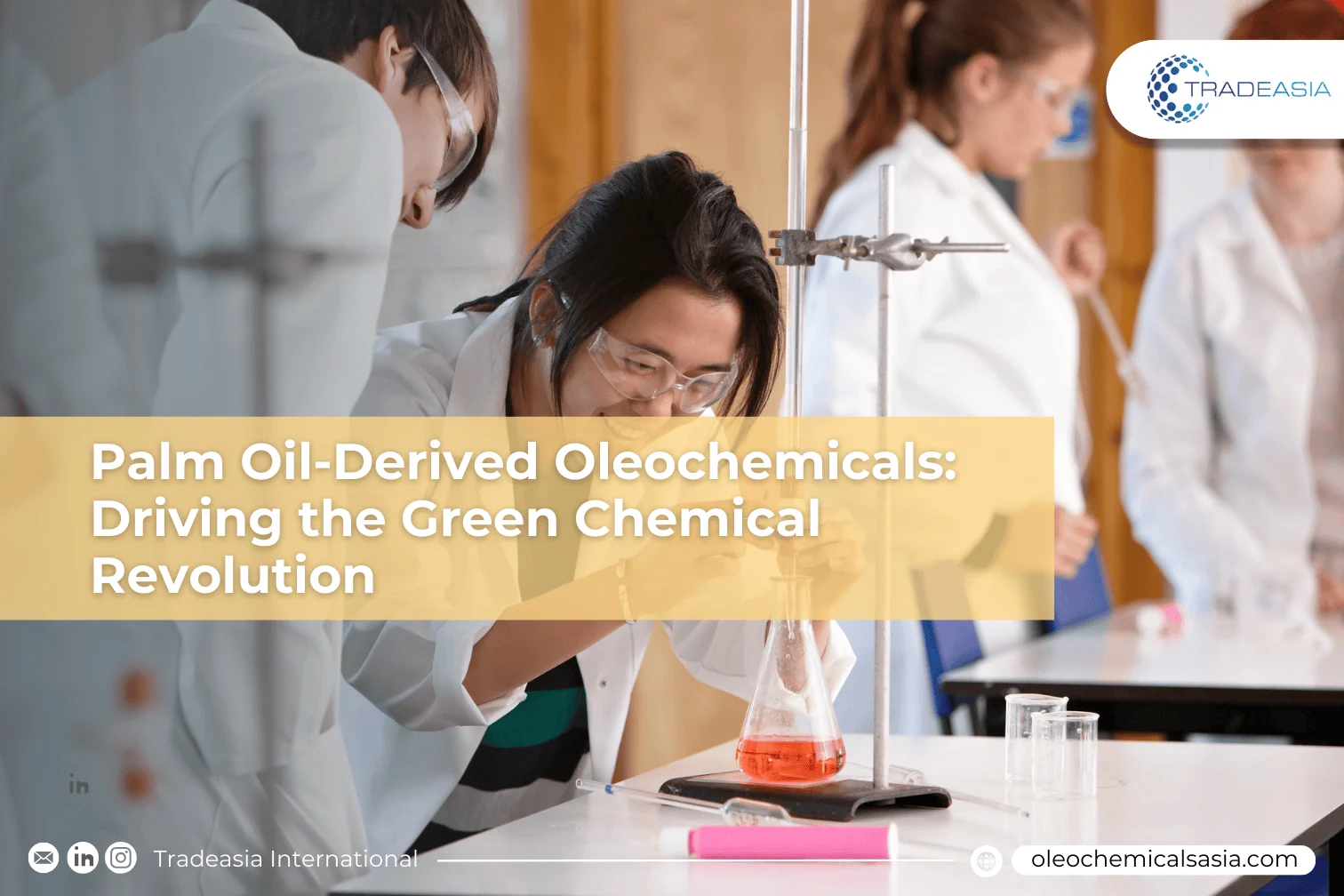Article
22 August 2025
Palm Oil-Derived Oleochemicals: Driving the Green Chemical Revolution
Oleochemicals

Table of Content
- Executive Summary
- A Greener Alternative to Petrochemicals
- Market Growth Driven by Versatility
Article
22 August 2025
Oleochemicals

Palm oleochemicals as green alternatives – Renewable, biodegradable, and less polluting substitutes for petrochemicals, with applications in surfactants, lubricants, plastics, and biodiesel.
Strong market growth – Competitive pricing and high yield drive a projected 6.5% CAGR through 2032, fueled by demand in personal care, industrial, and energy sectors.
Corporate and regulatory alignment – Companies are investing in sustainable sourcing and cleaner technologies to meet ESG targets and global environmental standards.
Future opportunities – Innovations in bioprocessing and new applications such as biodegradable polymers and eco-lubricants highlight palm oleochemicals’ role in the green chemical revolution.
Palm oil-derived oleochemicals are becoming a cornerstone in the global shift toward sustainable chemistry. Sourced from palm oil and palm kernel oil, these compounds—such as fatty acids, fatty alcohols, fatty methyl esters, fatty amines, and glycerine—offer renewable, biodegradable, and less polluting options compared to fossil fuel-based chemicals. Their wide range of functional properties has made them valuable in industries from surfactants and lubricants to plastics and biofuels, reinforcing the movement toward greener alternatives in global manufacturing.
One of the most visible applications of palm-based oleochemicals is in surfactants. These ingredients are essential in personal care items like shampoos and lotions, as well as in household cleaning and industrial products. By reducing surface tension and emulsifying oils, they ensure effectiveness in everyday formulations. More importantly, palm-derived surfactants are safer and more biodegradable than petrochemical options, addressing both consumer demand for eco-friendly products and stricter environmental regulations.
Industrial sectors are also increasingly turning to oleochemicals for their lubricant needs. Bio-based lubricants made from palm oil provide excellent biodegradability and low toxicity, offering a practical solution to the environmental risks posed by petroleum-based alternatives. Their renewable origin supports corporate ESG (Environmental, Social, and Governance) commitments, particularly in reducing carbon footprints and advancing circular economy principles.
Beyond cleaning agents and lubricants, palm oil plays a vital role in the development of biodegradable plastics. Breakthroughs in polymer chemistry now allow palm-derived monomers to substitute petrochemical-based plastics with materials that are biodegradable and non-toxic. This innovation helps address the global plastic waste crisis and supports the transition toward sustainable packaging solutions.
Palm oil oleochemicals also fuel progress in renewable energy. As a key raw material for biodiesel, they provide a renewable alternative to conventional diesel, significantly cutting lifecycle greenhouse gas emissions. This integration of biodiesel with chemical manufacturing demonstrates how palm oil supports an economically viable and environmentally beneficial biorefinery model, reducing reliance on fossil fuels while creating new market value.
The economic prospects for palm-based oleochemicals are just as compelling as their environmental benefits. Their competitive pricing, high yield, and versatility give them an edge over other vegetable oils. The global oleochemical market is projected to expand at a CAGR of around 6.5% through 2032, propelled by demand from personal care, industrial chemicals, and biofuels. This growth underscores their position as a critical driver of the green economy.
Major industry players are recognizing the strategic importance of palm-based oleochemicals. Companies are investing in cleaner processing technologies and sustainable palm oil sourcing to comply with evolving regulations and to meet the expectations of increasingly conscious consumers and stakeholders. By prioritizing bio-based solutions, they are embedding sustainability into the core of their business strategies.
The next wave of innovation lies in developing sustainable supply chains, advanced bioprocessing methods, and novel applications, including eco-friendly lubricants and high-performance biodegradable polymers. With continued investment and innovation, palm oleochemicals are set to play a defining role in the global transition to bio-based chemistry.
Palm oil-derived oleochemicals are more than just chemical substitutes; they are enablers of sustainable transformation. From personal care and industrial applications to renewable energy and plastics, they represent a powerful tool for reducing environmental impact, achieving ESG goals, and fostering green growth across industries worldwide.
We're committed to your privacy. Tradeasia uses the information you provide to us to contact you about our relevant content, products, and services. For more information, check out our privacy policy.
Leave a Comment